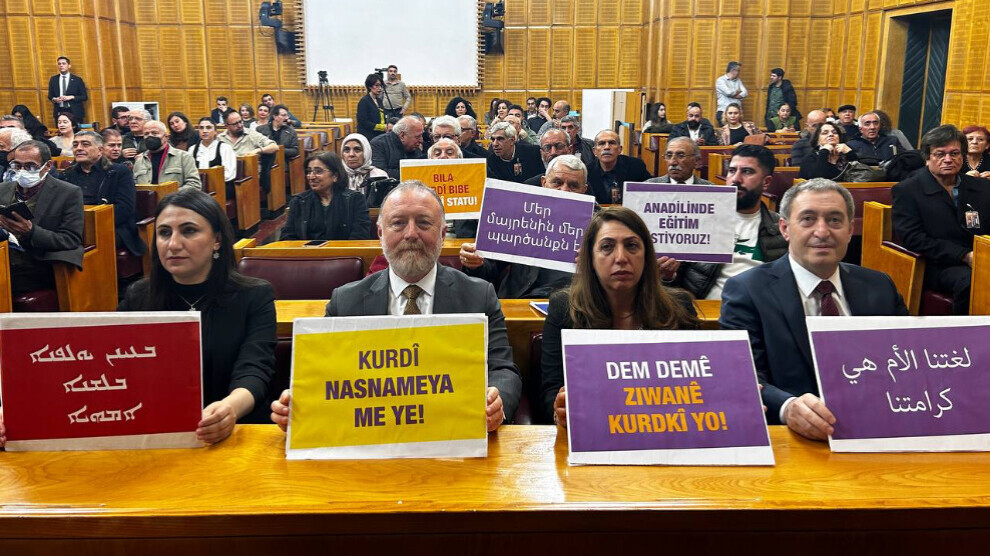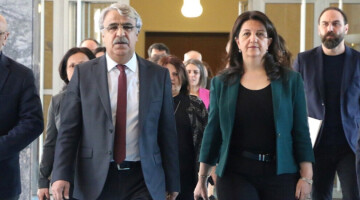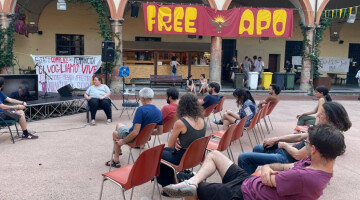The International Mother Language Day is a day of remembrance proclaimed by UNESCO to promote linguistic and cultural diversity and multilingualism. It has been celebrated annually on February 21 since 2000. To mark the occasion, the DEM Party (Peoples’ Equality and Democracy Party) held its weekly parliamentary group meeting in Ankara in several languages.
Co-Chair Tuncer Bakırhan gave his opening speech in the public part of the meeting in his native language, Kurmancî. "Around seven thousand languages are spoken in the world today. Ninety percent of these have been lost due to state assimilation policies. One hundred years ago, twenty languages were still spoken in Turkey. However, eighteen of them have been lost. A writer once said, ‘My mother tongue is my skin and other languages are my clothes.’ And we say that our mother tongue is not only our skin, but also our soul and life," said the Kurdish politician.
Bakırhan commemorated Baba Tahir Uryan, Elî Herîrî, Ehmedê Xanî, Melayê Cizîrî, Feqiyê Teyran, Cegerxwîn, Celadet Elî Bedirxan, Musa Anter, Ferhat Kurtay, Mehmed Uzun and other writers who stood up for the Kurdish language and read out the lyrics of a Kurdish song by the famous Dengbêj singer Eyşe Şan.
Referring to the state assimilation policy in Turkey, Bakırhan said: "The Kurdish language has been suppressed since the founding of the republic. Lazuri, Syriac, Circassian and many other languages have been eliminated. Turkey has turned into a cemetery of languages within a hundred years. The slogan 'Speak Turkish, speak a lot' is still written on the walls of prisons. Our language has survived to this day thanks to the resistance we have put up. The AKP wants to create an alternative Kurdology. It opened Kurdish departments at universities. However, the students who graduated there were not appointed to the civil service. Electives were set up and they opened a television program called TRT Şeş. But here the Kurdish language is insulted from morning to night. They want to create Kurds without Kurdish."
Following the introduction of trustee administration in the Kurdish municipalities, multilingual initiatives were systematically abolished, noted Bakırhan and continued: "Many newspapers, television stations, agencies, magazines, radios, publishing houses and schools were closed. The trustees first attacked the Kurdish symbols. Kurdî-Der and the Kurdish Institute were closed. They removed names such as Celadet Elî Bedirxan and Cegerxwîn from the signs. The trustees are enemies of the Kurdish language. Even Erdoğan has said that every child should know their mother tongue. However, when Kurds demand the right to their mother tongue, they are labeled as terrorists. If we speak Kurdish in parliament, it is noted in the minutes as an ‘unknown’ or an ‘incomprehensible’ language. Our language is neither unknown nor incomprehensible. Our language is Kurdish. We must speak our language in all areas of life and understand it as our existence. We have local elections ahead of us. When we take over the municipalities from the trustees, we will reintroduce multilingual local politics. Our language is our red line. We will open Kurdish courses and mother-tongue kindergartens. We are not against elective courses. But we are ashamed of this discussion in the 21st century. Spring does not come with a rose. Mother tongue is a human right. We want Kurdish to be recognized as an official language."
DEM deputies then greeted the attendees in six other languages: George Aslan in Syriac, Saliha Aydeniz in Kirmançkî, Bereket Kar in Arabic, Zeynep Bayram in Georgian and Lazuri and Murat Mıhçı in Armenian.















